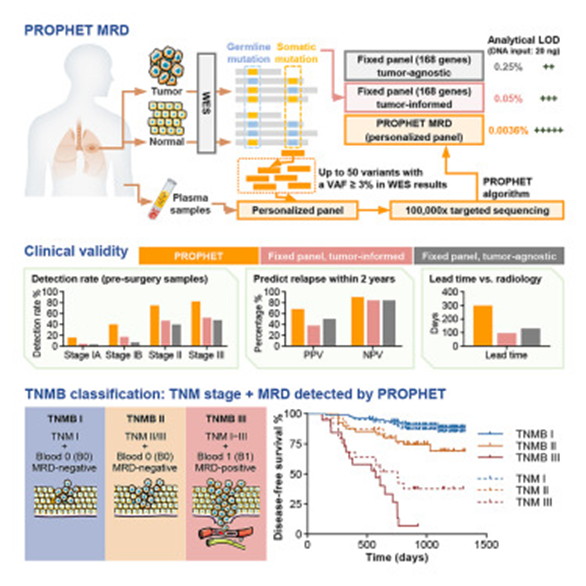Thoracic Surgery | Breakthrough Research on Postoperative Monitoring of Lung Cancer Residual Disease Published in Cancer Cell
胸部肿瘤研究所成果在顶级学术期刊发表
2023-10-11
In a recent development, the research findings on postoperative monitoring of minimal/measurable residual disease (MRD) in lung cancer by the team led by Associate Chief Physician Chen Kezhong, Professor Yang Fan, and Academician Wang Jun from the Department of Thoracic Surgery at Peking University People's Hospital (PKUPH), have been officially published in the prestigious international oncology journal, Cancer Cell (IF=50.3). The study, titled "Individualized Tumor-informed Circulating Tumor DNA Analysis for Postoperative Monitoring of Non-small Cell Lung Cancer", is the worlds first prospective clinical study comparing molecular residual disease detection strategies for early-stage lung cancer. Spanning five years from initial design to final publication, it innovatively addressed the practical challenges in translating MRD from scientific research results to clinical applications, offering a series of strategic insights for the clinical implementation of MRD detection.
The study focused on early and mid-stage operable non-small cell lung cancer (NSCLC) patients, comparing three MRD detection strategies: tumor-agnostic fixed panels, tumor-informed fixed panels based on tumor tissue detection, and personalized MRD using a customized PROPHET (a novel personalized tumor-informed technology) panel based on tumor tissue whole-exome sequencing (WES) with up to 50 target sites.

The prospective observational MEDAL study (NCT03634826) unveiled groundbreaking findings, including the detection of cancer signals at a dilution of 0.001% using the personalized PROPHET method. The study also established the superiority of a tumor TNMB staging system, combining liquid biopsy information over traditional TNM(tumor node metastasis) staging in prognosis prediction. PROPHET detection demonstrated superior prognostic value, with a median lead time of 299 days before recurrence compared to radiological findings.
Moreover, the study highlighted the potential of PROPHET for reassessing therapeutic efficacy after recurrence and its high concordance value for patients with ambiguous radiological findings. The findings emphasized the necessity of a personalized approach in MRD monitoring, showcasing PROPHET as a promising tool in the postoperative surveillance of lung cancer patients.

